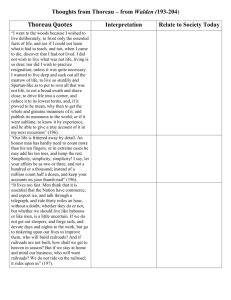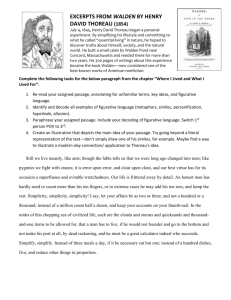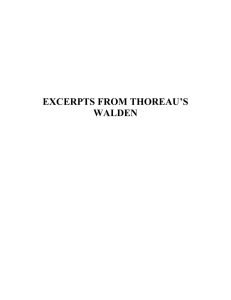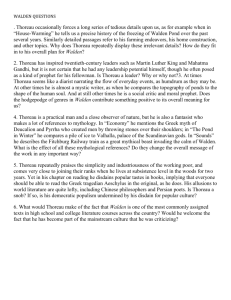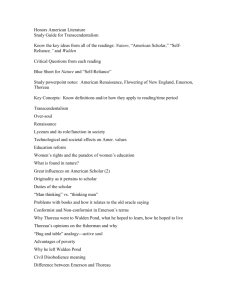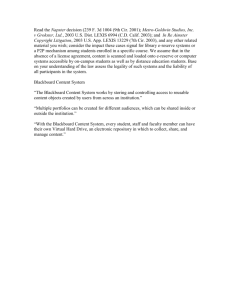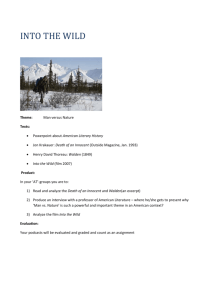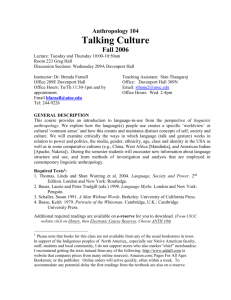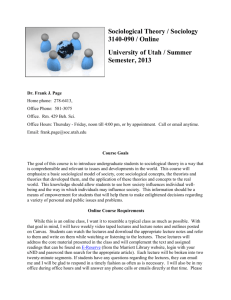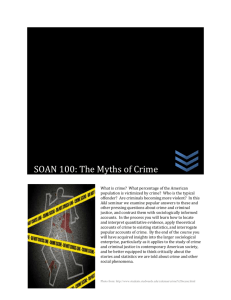The Environmental Consciousness - LEAP
advertisement
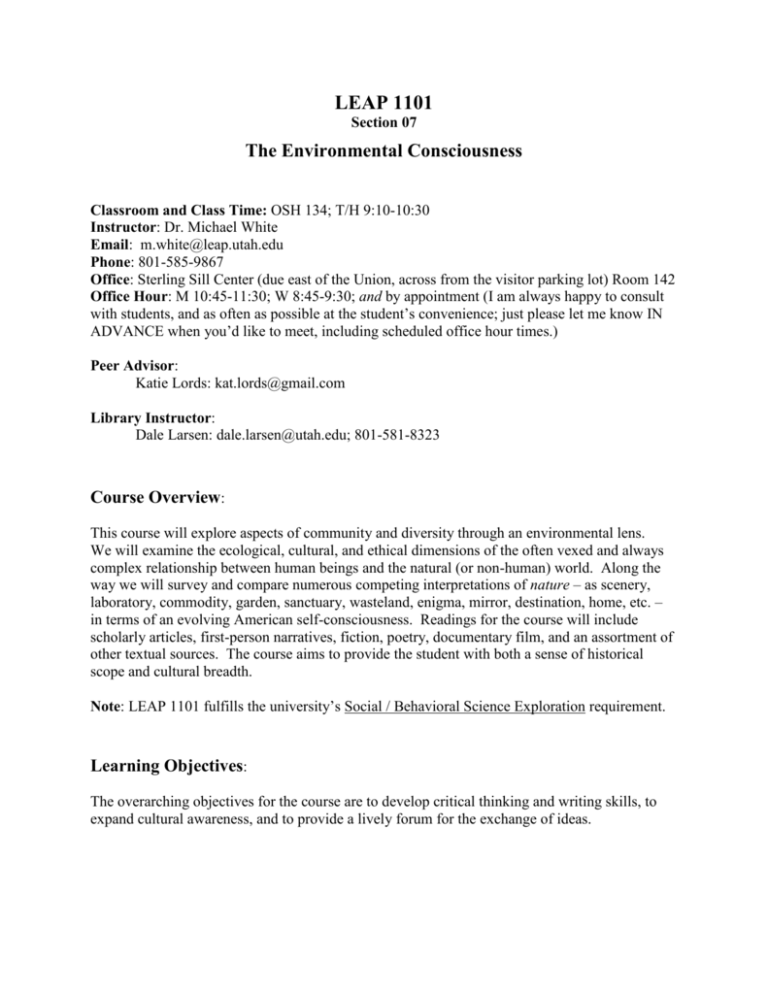
LEAP 1101 Section 07 The Environmental Consciousness Classroom and Class Time: OSH 134; T/H 9:10-10:30 Instructor: Dr. Michael White Email: m.white@leap.utah.edu Phone: 801-585-9867 Office: Sterling Sill Center (due east of the Union, across from the visitor parking lot) Room 142 Office Hour: M 10:45-11:30; W 8:45-9:30; and by appointment (I am always happy to consult with students, and as often as possible at the student’s convenience; just please let me know IN ADVANCE when you’d like to meet, including scheduled office hour times.) Peer Advisor: Katie Lords: kat.lords@gmail.com Library Instructor: Dale Larsen: dale.larsen@utah.edu; 801-581-8323 Course Overview: This course will explore aspects of community and diversity through an environmental lens. We will examine the ecological, cultural, and ethical dimensions of the often vexed and always complex relationship between human beings and the natural (or non-human) world. Along the way we will survey and compare numerous competing interpretations of nature – as scenery, laboratory, commodity, garden, sanctuary, wasteland, enigma, mirror, destination, home, etc. – in terms of an evolving American self-consciousness. Readings for the course will include scholarly articles, first-person narratives, fiction, poetry, documentary film, and an assortment of other textual sources. The course aims to provide the student with both a sense of historical scope and cultural breadth. Note: LEAP 1101 fulfills the university’s Social / Behavioral Science Exploration requirement. Learning Objectives: The overarching objectives for the course are to develop critical thinking and writing skills, to expand cultural awareness, and to provide a lively forum for the exchange of ideas. Required Texts: The three main texts listed below are available at the University Bookstore: Henry David Thoreau, Walden, Yale University Press, 2006 (ISBN 9780300110081) Cormac McCarthy, The Road, Vintage, 2006 (ISBN 9780307387899) Jack London, The Call of the Wild, Puffin Classics, 2008 (ISBN 9780141321059) Additional readings are available online through Course Reserves at the Marriott Library. These are required reading. Please print up the readings, organize them in a binder, and bring them to class as you would any other hardcopy text. Course Requirements and Grade Distribution: 30% - 3 Mini-tests (10 multiple choice/short answer questions each) 15% - Midterm Take-Home Test 30% - Final Research Assignment* 25% - Daily Attendance and Engagement (includes 4 typed symposia responses, spot quizzes, as well as library attendance & participation) * The research assignment for the course puts into practice the research skills and strategies covered in the three library sessions. The assignment includes a presentation and a written paper. The presentation allows students, working in small groups, to share their findings on a chosen topic relating to a region-specific environmental controversy/debate. (More specific guidelines and topic suggestions will be forthcoming in September.) At the end of term, students will turn in an argumentative research paper of approximately 2000 words. Students may opt to hand in a group paper (collaboratively authored) OR may hand in a paper authored independently. The written paper may be in whole or in part based on the presentation. The presentation accounts for one-third of the research assignment grade, and the paper accounts for the remaining two-thirds of the research assignment grade. Grading Format: 94 and above 90-93 87-89 84-86 80-83 77-79 74-76 70-73 67-69 64-66 60-63 below 60 A AB+ B BC+ C CD+ D DE Classroom Policies: Assigned work is due in class on the due date. Late work will receive partial credit unless prior arrangements are made (in exceptional cases). Please note that work sent via email or left in my box will not be accepted without prior arrangement. [Note that the final paper is due after classes end, and so this is the one occasion that work may be left in my box at the Sill Center.] Success in this class requires regular attendance and engaged participation. This includes being consistently punctual and contributing toward a classroom environment that fosters courtesy and respect. The use of non-class-related portable electronic devices is, respectfully, disallowed for the duration of each 80 minute class period. In order to be prepared for each class session, you must complete all of the assigned readings. Also, you are responsible for bringing all relevant readings to class on the day(s) they are slated to be discussed (see Class Schedule below). University Policies: Please read the following university-wide policies, and feel free to contact me with any questions or concerns: The Americans with Disabilities Act. The University of Utah seeks to provide equal access to its programs, services, and activities for people with disabilities. If you will need accommodations in this class, reasonable prior notice needs to be given to the Center for Disability Services, 162 Olpin Union Building, (801) 581-5020. CDS will work with you and the instructor to make arrangements for accommodations. All written information in this course can be made available in an alternative format with prior notification to the Center for Disability Services. Addressing Sexual Misconduct. Title IX makes it clear that violence and harassment based on sex and gender (which includes sexual orientation and gender identity/expression) is a civil rights offense subject to the same kinds of accountability and the same kinds of support applied to offenses against other protected categories such as race, national origin, color, religion, age, status as a person with a disability, veteran’s status or genetic information. If you or someone you know has been harassed or assaulted, you are encouraged to report it to the Title IX Coordinator in the Office of Equal Opportunity and Affirmative Action, 135 Park Building, 801581-8365, or the Office of the Dean of Students, 270 Union Building, 801-581-7066. For support and confidential consultation, contact the Center for Student Wellness, 426 SSB, 801581-7776. To report to the police, contact the Department of Public Safety, 801-5852677(COPS). Class Schedule: Please note that the readings listed for any particular day should be done BEFORE you come to class on that day. Bring all assigned readings to class. Dates of readings and assignments may change, so be aware of announcements. Week 1: August 25: Introduction to the course August 27: Exploring the Nature of Nature Week 2: September 1: Meriwether Lewis, selections from The Journals of Lewis and Clark (e-reserve, pages 95-104) William Cullen Bryant, “To a Waterfowl” (handout) Symposium #1 Due: What counts as nature? Are we still a part of nature, or have we developed to a point that we are now outside it, separate from it? (You do not need to tie your response to the Lewis or the Bryant readings.) September 3: Charles Darwin, selections from On the Origin of Species and The Descent of Man (e-reserve, pages 160-163) Week 3: September 8: Henry David Thoreau, Walden NOTE: You should plan to attend the LEAP Convocation, taking place Wednesday, September 9th between 4PM and 5PM at the gazebo in Officer’s Circle (map and directions to the event will be emailed). September 10: Glenn Bailey Poverty Workshop (held outside of our regular classroom in LNCO 1100) Week 4: September 15: Thoreau, Walden Symposium #2 Due: Summarize Thoreau’s notion of voluntary poverty. What is your assessment of this chosen way of life (benefits, drawbacks)? September 17: Thoreau, Walden Week 5: September 22: Thoreau, Walden September 24: University College Classroom Visit: Design Your Degree module (50 minutes) *Take-Home Test Distributed Mini-test #1 Week 6: September 29: LIBRARY DAY (meet in the Marriott Library, MLIB 1110) October 1: Thoreau, Walden Week 7: October 6: Barry Lopez, from Arctic Dreams (“Ice and Light”) (e-reserve, pages 908-913) John Muir, “A Wind-Storm in the Forests” (e-reserve, pages 250-258) October 8: Film screening: Wilderness and the West Take-Home Test Due Week 8: October 12-16: NO CLASSES (Fall Break) Week 9: October 20: LIBRARY DAY (meet in the Marriott Library, MLIB 1110) Wallace Stegner, “Coda: Wilderness Letter” (e-reserve, pages 514-519) October 22: Jack London, The Call of the Wild Symposium #3 Due: Wallace Stegner provides a somewhat unorthodox/unusual defense of wilderness. On what basis does he think that wilderness should be preserved? What do you think … who or what is wilderness for? Week 10: October 27: The Call of the Wild October 29: The Call of the Wild Week 11: November 3: Film Screening: Grizzly Man (2005; Werner Herzog, dir.) *Note this film contains graphic language. Mini-test #2 November 5: Film Screening: Grizzly Man (2005; Werner Herzog, dir.); and post-film discussion Week 12: November 10: Aldo Leopold, from A Sand County Almanac (“Thinking like a Mountain”) (e-reserve, pages 381-382) Barry Lopez, from Arctic Dreams (“Migration”) (e-reserve, pages 903-908) Symposium #4 Due: What is director Werner Herzog’s main “take” on Timothy Treadwell’s radical experiment with Alaskan grizzly bears? Do you agree with Herzog? Explain. November 12: Terry Tempest Williams, “The Clan of One-Breasted Women” (e-reserve, pages 1091-1098) Cormac McCarthy, The Road Week 13: November 17: LIBRARY DAY (meet in the Marriott Library, MLIB 1110) November 19: McCarthy, The Road Week 14: November 24: McCarthy, The Road November 26: NO CLASS: Thanksgiving Holiday Week 15: December 1: McCarthy, The Road December 3: Research Assignment Presentations Mini-Test #3 Week 16: December 8: Research Assignment Presentations December 10: Research Assignment Presentations Snarfing of Snacks RESEARCH PAPER DUE: Monday, December 14th by noon in my box in the Sill Center Notable Dates: Library Days: Sept. 29 Oct. 20 Nov. 17 Holidays, Etc.: Oct. 12-16: Fall Break Nov. 26: Thanksgiving Holiday

